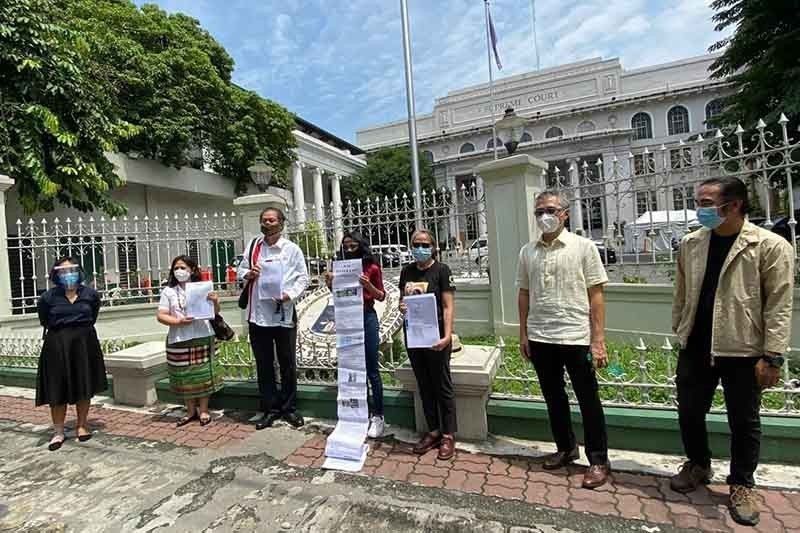With SC debate on anti-terror law set for January, 2 Aetas may spend holidays in detention

MANILA, Philippines — The Supreme Court has set oral arguments on the 37 petitions challenging the Anti-Terrorism Act in January 2021.
An advisory sent to reporters on Friday showed that the oral arguments will be held on Jan. 19, 2021 afternoon. At least one petitioner has received the advisory also on Friday.
The advisory also showed that among the issues the oral arguments will look into is whether a temporary restraining order or a status quo ante order against the law should be issued.
There are currently 37 pending challenges to the anti-terrorism law, which President Rodrigo Duterte signed in July.
Two Aetas have been detained on a non-bailable charge due to their supposed violation of the Republic Act 11479, the Anti-Terrorism Act, according to the National Union of Peoples’ Lawyers. Like the Human Security Act that it repealed, the new anti-terror law counts as its first targets members of the country's indigenous peoples' communities.
RELATED: FLAG urges SC: Shield people from 'terror' of anti-terror law, issue TRO | Carpio, Carpio-Morales prod SC: Filipinos 'chilled to silence' by fear of anti-terrorism law
NUPL president Edre Olalia told reporters they are glad that the SC has finally set a date for the oral arguments.
With the question of whether to issue a Temporary Restraining Order or a Status Quo Ante Order tabled as preliminary issue, however, Olalia said they are apprehensive of “further onslaughts on basic rights [will] happen considering the current intensifying political weaponization of the law."
In a manifestation filed earlier this week, the NUPL cited the case against Jasper Gurung and Junior Ramos, who are accused of “conspiring, confederating and cooperating with each other” and engaged in acts “intended to cause death or serious bodily injury to any person or endangers a [person’s] life, by firing and shooting at members of the Armed Forces of the Philippines.”
Olalia said information gathered by their lawyers suggests the charges were "a way of reprisal against unarmed civilians (indigenous people) for a death of a soldier in an alleged encounter with the [New People's Army] in the area."
"So it proves that almost anything can be contorted to fit the broad and vague definition of terrorism under the ATA," he also said.
Referring to the charges against Gurung and Ramos, Olalia said: "If there is no TRO/SQA until January, then invoking a TRO/SQA from the High Court as a potential ground to at least defer or archive the proceedings on the terrorism charge is diminished."
He clarified, however, that "there is a checklist of other legal remedies at the pre-trial or trial stage independent of this scenario to seek their release meanwhile."
But the two face another legal challenge. They have been charged — falsely, according to Olalia — "with another non-bailable charge of illegal possession of explosives and ammunition."
Preliminary and substantive issues
Aside from the issue of the issuance of a TRO or SQAO, the SC also said discussion during the preliminary issues shall cover:
- Whether petitioners have legal standing to sue
- Whether petitions raised actual and justiciable controversy
- Whether the direct resort to the tribunal is proper
- Whether facial challenge is proper
- Whether RA 11479 should already be declared unconstitutional in its entirety if the Court finds that the definition of terrorism and the powers of the Anti-Terrorism Council are constitutionally infirm
The SC has also determined at least 15 substantive issues that will be deliberated on the oral arguments, which include whether Section 4 of the law that defines terrorism and other offenses are void for vagueness or violate several rights.
The court will also look into whether the powers of the Anti-Terrorism Council such as its power to designate terrorist individuals or groups are unconstitutional.
READ: 'Mother of red-tagging': No process yet to remove names from terror list
It will also determine whether the pre-trial detention period of up to 24 days under Section 29 of the law violates the Constitution, Revised Penal Code, Rules of Court and international obligations against arbitrary detention.
The court will also deliberate whether the anti-terrorism law violates the indigenous peoples and Moros’ rights to self-determination and self-governance under the Constitution.
Issues not covered by the oral arguments will be discussed in written memoranda.
Grouped according to shared issues raised?
The advisory, signed by Clerk of Court Edgar Aricheta, said petitioners and respondents, through their counsels, are given 30 minutes per side to present their arguments.
"Counsels for each side are directed to coordinate with each other and, thereafter, submit to the Court a manifestation stating: (a) the name/s of the presenting lawyer/s on each issue or group of issues; and (b) the time allotted for each lawyer, the total of which should not, exceed the time limit," it added.
The petitioners and respondent are required to submit its manifestation by Jan. 13, 2021.
Chief Justice Diosdado Peralta earlier said justices had to determine common issues in the petitions then conduct a preliminary conference. “Petitioners who have common issues, they will appoint one to argue,” the chief justice said in a press briefing on October 23.
Meanwhile, Solicitor General Jose Calida is allowed to bring with him not more than three lawyers on the day of the oral arguments.
The SC set the preliminary conference on the case on November 26.
- Latest
- Trending
































